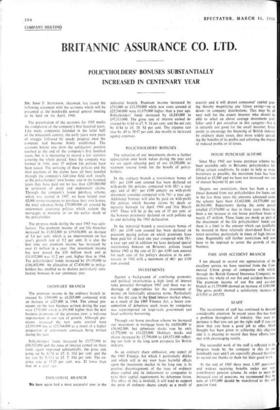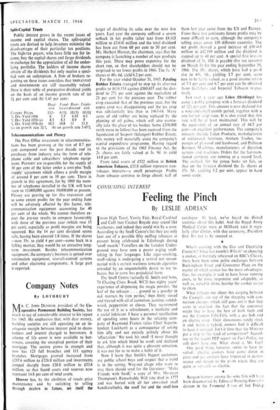BRITANNIC ASSURANCE CO. LTD.
POLICYHOLDERS' BONUSES SUBSTANTIALLY INCREASED IN CENTENARY YEAR
MR. JOHN F. JEFFERSON, Chairman, has issued the following statement with the accounts which will be presented at the hundredth annual general meeting to be held on 1st April, 1966.
The presentation of the accounts for 1965 marks the completion of the company's first hundred years. Like many companies founded in the latter half of the nineteenth century, the early years were years of struggle followed by steady progress once the company had become firmly established. The accounts before you show the satisfactory position reached at the end of the company's first hundred years, but it is interesting to record a few statistics covering the whole period. Since the company was formed in 1866, over 37 million life policies have been issued. The servicing of these policies and the final payment of the claims have all been handled through the company's full-time field staff, usually at the policyholders' own homes, and in the hundred years they have paid out no less than £205,000,000 in settlement of death and endowment claims. Through the company's house purchase scheme, which was started in 1907, we have helped over 62,000 owner-occupiers to purchase their own homes, the total advances being £70,000,000 all covered by endowment assurance policies which redeem the mortgages at maturity or on the earlier death of the policyholder.
The progress made during the year 1965 was satis- factory. The premium income of our life branches increased by £1,012,000 to £19,636,000, an increase of 5.4 per cent which is an improvement on last year's growth rate of 5.2 per cent. It is also the first time our premium income has increased by over £1 million in a year. Our investment income has now passed the £10 million mark and at £11,032.000 was 11.2 per cent, higher than in 1964. The policyholders' funds increased by £9,139,000 to £166.492,000. An allocation of £7,434,000 to policy- holders has enabled us to declare particularly satis- factory bonuses in our centenary year.
ORDINARY BRANCH The premium income in the ordinary branch in- creased by £300.000 to £6,285,000 compared with an increase of £225,000 in 1964. The annual pre- miums on the new business written during the year were £792.000 which is £91.000 higher than the new business premiums of the previous year; a welcome improvement in our rate of growth. Although pre- miums increased the new sums assured were £2,589.000 less at £23,544.000 as a result of a higher proportion of endowment contracts being written during the year.
Policyholders' funds increased by £3,777,000 to £60,382.000 and the rates of interest earned on these funds again improved substantially, the gross rate going up by 6/7d to £7. 6. I Id per cent. and the net rate by 5/lid to £5. 7. 10d per cent. The ex- pense rate at 15.25 per cent. was .21 lower than that of a year ago.
INDUSTRIAL BRANCH We have again had a most successful year in the
industrial branch. Premium income increased by £711.000 to £13,350,000 while new sums assured at £25,740,000 were £1,879,000 higher than a year ago. Policyholders' funds increased by £6,243,000 to £97.113,000. The gross rate of interest earned in- creased by 6/4d to £7. 9. 3d per cent, and the net rate by 4/4d to £6. 10. 8d per cent The expense rate rose by .49 to 30.87 per cent. due mainly to increased agency expenses.
POLICYHOLDERS' BONUSES The valuation of our investments shows a further appreciation over book values during the year and we are again releasing part of our £8,250,000 in- vestment reserve funds for the benefit of policy- holders.
In the ordinary branch a reversionary bonus of 65/- per £100 sum assured has been declared on with-profit life policies, compared with 62/- a year ago, and of 60/- per £100 annuity on with-profit retirement annuities compared with 54/- a year ago. Additional bonuses will also be paid on with-profit life policies which become claims by death or maturity between 1st April 1966 and 31st March 1967. These will be at the rate of 15 per cent, of the bonuses previously declared on such policies up to and including the 1963 declaration.
In the industrial branch a reversionary bonus of 65/- per £100 sum assured has been declared on premium paying polices on which premiums have been paid for at least one year compared with 58/- a year ago and in addition we have declared special reversionary bonuses on Britannic policies issued before 1962 at the rate of 2/- per £100 sum assured for each year of the policy's duration at its anni- versary in 1962 with a maximum of 40/- per £100 sum assured.
INVESTMENTS
Against a background of continuing economic and political uncertainties a high level of interest rates prevailed throughout 1965 and there was no shortage of opportunities for the investment of money on historically attractive terms. Particularly was this the case in the fixed interest market where, as a result of the 1965 Finance Act, a heavy con- centration of debenture stock issues by companies was superimposed on large-scale government and local authority borrowing.
Through our house purchase scheme we increased our investment in mortgage loans by £4,026,000 to £36,862.000, but debenture stocks rose by only £1,772.000 to £18,225,000. Ordinary stocks and shares increased by £5,790,000 to £49,873,000 reflect- ing our faith in the long term prospects for British industry.
As an ordinary share enthusiast, one aspect of the 1965 Finance Act which I particularly dislike and which will in my view have harmful effects upon the investment market in the long run, is its positive discouragement of the issue of ordinary share capital and its inducement to companies to raise their capital requirements by debenture issues. The effect of this is twofold; it will tend to support the price of ordinary shares simply as a result of scarcity and it will distort companies' capital gear- ing thereby magnifying any future swings—up or down—in company distributions. This may be all very well for the expert investor who should be able to select an above average investment port- folio—and I put ourselves in this category—but it is certainly not good for the small investor; better surely to encourage the financing of British industry by ordinary share issues, thus more widely spread- ing the benefits of its profits and softening the impact of reduced profits or of losses.
HOUSE PURCHASE SCHEME Since May 1962 our house purchase scheme has been available only to Britannic policyholders ful- filling certain conditions. In order to help as many borrowers as possible, the maximum loan has been limited to £3,500 and we have not increased our rate of interest beyond 61 per cent.
Despite our restrictions, there has been a con- tinual demand from our policyholders for loans and in the last three years the amounts advanced under the scheme have been £3,662,000, £4,578,000 and £6,563,000. Repayments during the same period totalled £7,874,000 so that in three years there has been a net increase in our house purchase loans of nearly £7 million. These loans are made as part of the investment of the life policyholders' funds and there is a limit to the amount which can justifiably be invested in these relatively short-dated fixed in- terest securities, particularly in times of high interest rates. Regrettably still further restrictions will now have to be imposed to arrest the growth of this business.
FIRE AND ACCIDENT BRANCH I am pleased to record our appreciation of the excellent service we have received from the Com- mercial Union group of companies with which, through the British General Insurance Company. we reinsure the whole of our fire and accident business. The premium income of our fire and accident branch at £1,559,000 showed an increase of £105,000. The gross profit showed a satisfactory increase of £13,518 to £69.532.
STAFF
The recruitment of staff has continued to demand considerable attention. In recent years this has been a problem throughout all industry. Our own ex- perience is that you can get the right staff if you can show that you have a good job to offer. Much thought has been given to achieving this objective and it is pleasing to record that these efforts have met with encouraging results.
The successful work of the staff is reflected in the progress made by the company in this its one hundredth year and I am especially pleased therefore to record our thanks to them for their good work At the end of 1965 there were 1,307 pensioners and widows receiving benefits under our non- contributory pension scheme. In order to meet the increased cost of pensions, we recommend that the sum of £493.000 should be transferred to the staff pension fund.
Public interest grows in the recent issues of income and capital shares. The split-capital trusts are devised to help investors minimise the disadvantages of their particular tax positions. The high-tax payers, who have little use for in- come, buy the capital shares and forgo dividends in exchange for the appreciation of all the under-
lying portfolio. The holders of income shares obtain all the dividends but only receive a speci- fied sum on redemption. A firm of brokers re- porting on these issues considers that TainEvEs-r and ROSED1MOND are still reasonably valued. Here is their table of prospective dividend yields on the basis of an income growth rate of (a) 35 per cent and (b) 5.45 per cent: Dual- Fund- Rose- Triple- vest invest dinzond vest
Current Prices I1/- 6/15 10/55 10/01 ?,!, Div. Yield 1966 6 5.3 6.45 6.1 % Div. Yield 1976 (a) 8.5 8.3 8.9 9
% Div. Yield 1976(b) 10.5 10.8 11 11.5 (a) on growth rate 35% (b) on growth rate 5.45% Telecommunications and Plessey
The Post Office investment in telecommunica- tions has been growing at the rate of 8.7 per
cent compound over the past decade and its purchases from industry take the form of tele- phone cable and subscribers' telephone equip- ment. PLESSEY are responsible for the supply of 30 per cent of the latter under a cost-plus 'bulk supply' agreement which allows a profit margin of around 8 per cent to 10 per cent. There is growth in this agreement, for by 1969 the num- ber of telephones installed in the UK will have risen to 15,000,000 against 10,000,000 at present.
Plessey are gearing up for this expansion and to some extent profits for the year ending June will be adversely affected by this factor, tele- communication equipment accounting for 40 per cent of the whole. We cannot therefore ex- pect the pre-tax results to compare favourably with those of the previous year (which rose 15 per cent), especially as profit margins are being squeezed. But the 14 per cent dividend seems safe, having been covered 1.8 times. If the shares -now 35s. to yield 4 per cent-come back in a falling market, they would be an attractive long- term investment. Besides telecommunication equipment, the company's business is spread over automation equipment, aircraft-control systems and other electronic components. A large part is exported.







































 Previous page
Previous page